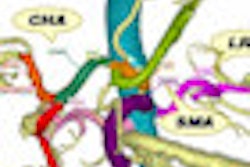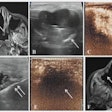
NEW YORK (Reuters Health), Sep 7 - Both immunological and guaiac-based fecal occult blood tests (FOBTs) have a higher sensitivity and lower specificity for detection of advanced colorectal neoplasm among men than among women, German investigators report.
These differences "might require careful attention in the interpretation of test results, and in the design, modeling, and evaluation of colorectal cancer (CRC) screening strategies," lead author Dr. Hermann Brenner and associates suggest in the American Journal of Gastroenterology, published online August 10.
But the problem can't be solved by simply raising the cutpoint for men, which would result in greater sex differences in predictive values, the authors say.
The research team at the German Cancer Research Center, Heidelberg, studied results for 2,324 men and women (mean age 62-63) who underwent screening colonoscopy between 2005 and 2009. Subjects also provided stool samples for testing one guaiac-based FOBT, one quantitative immunological FOBT, and six qualitative immunological FOBTs.
Colonoscopists found more advanced colorectal neoplasms among men (13.5%) than among women (7.5%, p < 0.0001). Men also had more than twice as many colorectal cancers and advanced adenomas of at least 1 cm in diameter, as well as a greater tendency to multiple neoplasms among those with advanced neoplasms (55% vs 41%, p = 0.058).
At any cutpoint of the quantitative immunological FOBT and for all qualitative immunological FOBTs and the guaiac-based FOBT, the sensitivity and positive predictive value were substantially higher among men, and specificity and negative predictive value were substantially lower.
For example, for the one quantitative immunochemical FOBT using a cutpoint of 2 mcg/g recommended by the manufacturer, the sensitivities for advanced colorectal neoplasms were 47.7% for men and 30.7% for women; specificities were 85.0% and 89.5%; positive predictive values were 33.0% and 19.3%; and negative predictive values were 91.3% and 94.1%, respectively (all statistically significant differences).
For the six qualitative immunochromatographical FOBTs and the guaiac-based FOBT, sex differences were statistically significant for sensitivity in three tests, for specificity in six, for positive predictive values in three, and for negative predictive values in all seven.
The worst performing test was the guaiac-based FOBT, for which sex differences were especially great. In fact, it couldn't differentiate between women with and without advanced neoplasms.
At least part of the reason for the disparities was the increased incidence of cancers and large adenomas in men, Dr. Brenner's group says.
"There are a number of plausible reasons why fecal occult blood tests could perform differently in women and men, such as different colonic transition times," Dr. Brenner told Reuters Health in an e-mail.
"The next step actually has to be modeling of screening strategies that takes the observed sex differences into account," he added.
Dr. Leo G. van Rossum, from Radboud University Nijmegen Medical Center, the Netherlands, disagrees with Dr. Brenner's group regarding the development of sex-based CRC screening strategies.
"I think no policy maker will venture on that road without extreme evidence for huge gender differences in benefit versus harm ratios for screening in men and women," he told Reuters Health.
"Cost-effectiveness is all but guaranteed for both men and women even at the lowest cutoff values," he added in an e-mail. "So why consider difficult differentiated screening protocols?"
He also faults the study for the small number of actual CRCs, and for the fact that women in the trial were younger than the men, even though incidence of CRC starts to rise approximately five years later in women than in men.
"I do agree that a 'careful consideration' of gender and age differences in colorectal cancer screening warrants further study and discussion, but that was already acknowledged by several other authors in previous publications," he said.
By Karla Gale
Source: http://link.reuters.com/fyc26n
Am J Gastroenterol 2010.
Last Updated: 2010-09-06 11:00:33 -0400 (Reuters Health)
Related Reading
Colorectal cancer screening participation is highest with immunochemical test, December 31, 2009
Delayed return of fecal blood tests may miss colorectal cancers, August 11, 2009
Copyright © 2010 Reuters Limited. All rights reserved. Republication or redistribution of Reuters content, including by framing or similar means, is expressly prohibited without the prior written consent of Reuters. Reuters shall not be liable for any errors or delays in the content, or for any actions taken in reliance thereon. Reuters and the Reuters sphere logo are registered trademarks and trademarks of the Reuters group of companies around the world.



















